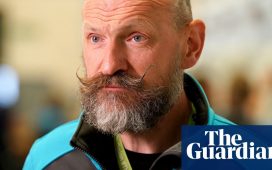A “toxic culture” of bullying, sexual harassment and drug-taking risks compromising the safety of Europe’s most hazardous nuclear site, multiple employees at Sellafield have claimed.
More than a dozen current and former employees have alleged to the Guardian that the Cumbrian site, a vast dump for nuclear waste, has a longstanding unhealthy working culture, where staff have been bullied, harassed and belittled, with some apparently pushed to suicide.
The site’s human resources department has been accused of taking a “bully, break, bribe” approach to dealing with employees who raise concerns over their colleagues and site safety.
Whistleblowers warn that the toxic culture could have dangerous consequences for safety and security at Europe’s biggest nuclear waste dump, which hosts decades of radioactive material. The revelations have emerged as part of Nuclear Leaks, a year-long Guardian investigation into cyber hacking, radioactive contamination and toxic workplace culture at the 6 sq km (2 sq mile) site.
A whistleblower, Alison McDermott, a consultant who said she was sacked in 2018 after raising concerns over Sellafield’s culture and sexual harassment, warned that this climate heightens the risk of not just accidents and mistakes, but also terrorism and sabotage.
“Those risks are far more likely to materialise if you’re working in a highly toxic and dysfunctional culture,” she claimed.
The vast taxpayer-funded site employs 11,000 staff, who are tasked with making safe crumbling buildings containing nuclear waste. It is one of the biggest employers in the north-west, with generations of the same families working there.
The investigation into Sellafield has found:
-
Several suicides apparently linked to the pressures of working at the site.
-
A former young worker who claimed he was bullied to the point where he “just wanted to die” after he was repeatedly mocked over his sexual experience.
-
Workers who alleged they have either experienced or witnessed incidents of sexual assault.
-
Staff who allegedly regularly bring cocaine on to the site and keep samples of untainted urine in case of random drugs tests.
A 2020 report published by the Office for Nuclear Regulation (ONR), which monitors the site, warned that an unhealthy work culture played a part in the biggest-ever nuclear disasters, including Chornobyl in 1986 and Fukushima in 2011.
The report stated: “The role of organisational culture in maintaining nuclear safety is well established: reports of investigation into notable events such as Three Mile Island, Chornobyl, Davis-Besse and Fukushima provide compelling evidence of the importance of establishing an effective nuclear safety culture.”
Sellafield is one of the dominant employers in the west Cumbria region, together with BAE Systems, which makes Britain’s nuclear submarines in nearby Barrow-in-Furness, paying salaries that are typically higher than the regional average. Generations of families are heavily dependent on Sellafield for work and sources said that alternative employment is difficult to find for those who leave after attempting to raise concerns.

It is understood that several suicides have been linked to the pressures of working at the site in recent years.
Sources with knowledge of medical services at the site claimed that there have been a disproportionately high number of severe mental ill-health episodes, suicides and suicide attempts among the workforce.
The wider Cumbria region has a suicide rate that is 50% higher than the average in England. While there is no official data on the number of suicides linked to the site, a source claimed the rate at Sellafield is even higher. Sellafield declined to confirm whether it has records of suicides among its employees.
“You have to consider Sellafield and the surroundings in the same way you might an army base and its host town,” said a source with medical knowledge of the site. “The level of risk of suicide or intense mental ill-health in hothouse conditions like this is higher, as any issue at work is also a social issue in an area like this. People often feel they can’t escape.
“Sellafield workers are a high risk group for suicide, and the numbers, while too small for statistical analysis, suggest that it has an outsized suicide and mental health problem for its worker population.”
Some current and former staff say they have felt the sense of being in a “goldfish bowl” where they are unable to leave the site behind in rural communities after finishing their working day.
There are also concerns over claims of bullying. A source who began working at a young age for a contractor on the site has described how colleagues routinely “picked away at me to find out my biggest vulnerabilities”. In a written account, seen by the Guardian, the young worker said he was called a “virgin”, a “faggot” and a “pussy” and was mockingly given the name “top shagger” as colleagues speculated about his sexual experience.
“My confidence sunk to an all-time low and they made me feel that I wasn’t worthy of being a human being and I just wanted to die,” he wrote. “It’s now almost four years on – I am not even close to recovering physically and mentally.”
He also alleged that colleagues would regularly bring cocaine on to the site and that some “even kept samples of their urine in case of a drugs test”.
Several other sources at the site have questioned the effectiveness of the drug testing regime at the site.
Last year, it emerged that seven workers tested positive for drugs after 741 workers were randomly tested between November 2021 and November 2022.
There are also concerns about allegations of racist, misogynistic and other troubling behaviour at Sellafield. In late 2020, a network of ethnic minority employees wrote to the company’s board, listing 27 alleged racist incidents.
A senior industry source said that a hardcore of longstanding Sellafield employees who are resistant to change are known as “We Bees” – short for “we be here when you be gone”.
A former employee said: “There is zero staff turnover, and often three generations of the same family are working on site. Everyone sees it as a job for life and it is a very insular community. When you are trying to change that mentality it is very difficult and challenging.”
Multiple sources described the response from the human resources department to those who spoke out as “bully, break, bribe”. Sellafield did not comment on the allegation.
In a report prepared for the NDA in 2019 by consultants at PwC, and seen by the Guardian, one employee said: “I feel like I’m punished by HR when I stand up and report bad behaviour.”

McDermott, an experienced HR consultant who has consulted for a range of blue-chip organisations, was brought in to identify issues with Sellafield’s culture and make recommendations. However, she alleges she was fired after telling managers that an investigation should be carried out into claims of sexual harassment and a subsequent cover-up. She is awaiting a decision on her case from the court of appeal after a lengthy legal battle with Sellafield.
McDermott said: “The gravity of the bullying and harassment and the abuse employees were being subjected to was just really shocking and off the scale and there clearly was an endemic problem with bullying and harassment at Sellafield.”
McDermott, an equality consultant, has spoken to scores of current and former employees before and after she was let go in 2018. She raised concerns over claims of sexual harassment by an employee and allegations of a subsequent cover-up at Sellafield.
“Employees said to me that because it was not safe to speak out that they had learned just to keep their heads down and look away just to survive but a survival mentality is not what you want at a nuclear plant because even one mistake, just one mistake, can set off a chain of reactions which could have catastrophic consequences – as we’ve seen with Chornobyl.
“Trust is the cornerstone, it’s the absolute bedrock of safety in any organisation – if employees are demoralised and scared to speak out or are being treated really badly then it will have a direct impact on safety.
“The risks at Sellafield, they’re not just confined to the risks of an accident or a mistake – as serious as that could be – there are other really serious risks at Sellafield such as acts of terrorism, or even deliberate sabotage. And obviously those risks are far more likely to materialise if you’re working in a highly toxic and dysfunctional culture.”
She added: “[The legal battle] has cost me financially and impacted my health.”
In a 2018 report of a call to the Safecall whistleblowing hotline, a manager was accused of sexually harassing women for several years. “This has been covered up and not actioned,” the employee claimed.
In response to a freedom of information request, Sellafield said it had spent £724,481.82 in the past five years defending employment-related matters.
A Sellafield spokesperson said: “There is no place for bullying and harassment at Sellafield. We do not tolerate it and where we find it, we take action. If anyone has information related to employee misconduct we urge them to come forward so we can investigate.
“We’re committed to ensuring all of our employees are respected, included, and able to perform at their best.
“We regularly seek the views of our workforce, and it was a survey in 2018 that brought focus to concerns about bullying and harassment.
“We confronted the issue, proactively shared information with employees, and developed a company-wide improvement programme. This work is continuing, and we remain as committed as ever to eradicating unacceptable behaviour from our workplace.
“Since 2018 we have implemented a number of improvements including increased resources for mediation, counselling, and our confidential employee assistance line. We also have a wide range of employee-led networks which provide peer support and advocate for change and improvements.”
Sellafield declined to comment on McDermott’s case. It has previously said that her claims are “entirely without substance” and noted that an appeal against the findings of her employment tribunal upheld its original ruling.
An ONR spokesperson said: “Sellafield is the most intensely regulated nuclear site in Britain and we undertake several hundred inspections and engagements every year.
“We have found no evidence that cultural issues have resulted in unsafe activities on the site. However, we are not complacent and will continue to scrutinise Sellafield closely to ensure that safety and security remain their highest priorities and are not compromised by any factors, including internal culture and behaviours.”
Claire Coutinho, the secretary of state for energy security and net zero, wrote to the Nuclear Decommissioning Authority which owns Sellafield on Tuesday after the Guardian’s investigation into the site. She requested a “urgent” update on efforts to fix any concerns about its workplace culture.










